外研版(2019)选择性必修 第一册Unit 6 Nurturing nature Using language课件(共19张)
文档属性
| 名称 | 外研版(2019)选择性必修 第一册Unit 6 Nurturing nature Using language课件(共19张) |
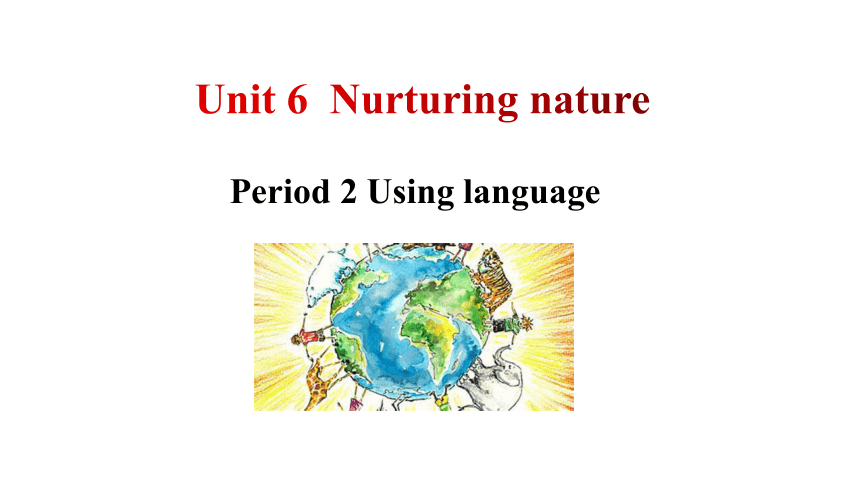
|
|
| 格式 | pptx | ||
| 文件大小 | 1006.6KB | ||
| 资源类型 | 教案 | ||
| 版本资源 | 外研版(2019) | ||
| 科目 | 英语 | ||
| 更新时间 | 2024-11-16 00:00:00 | ||
图片预览

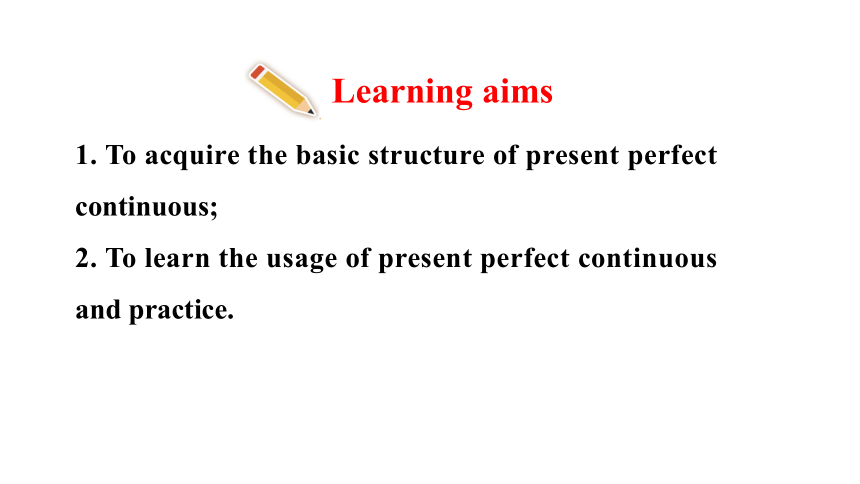
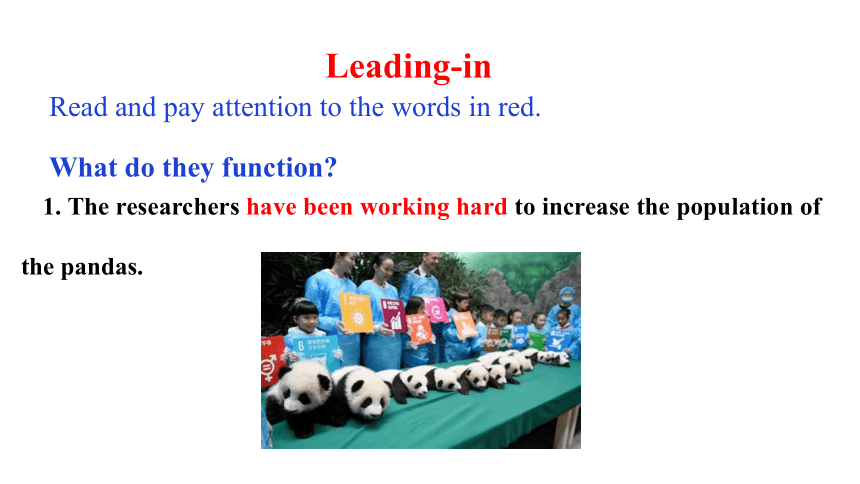

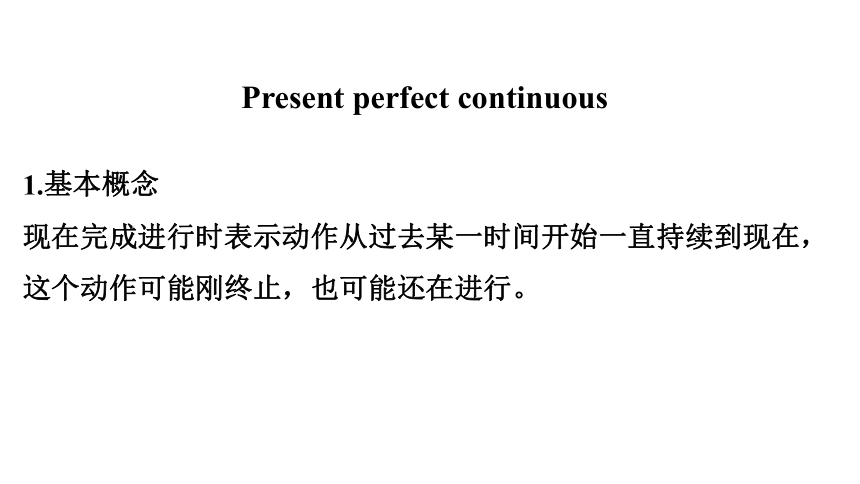
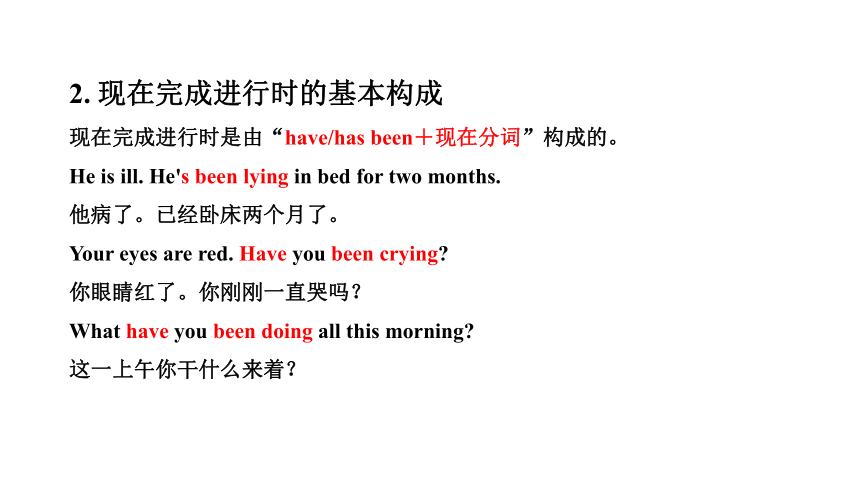
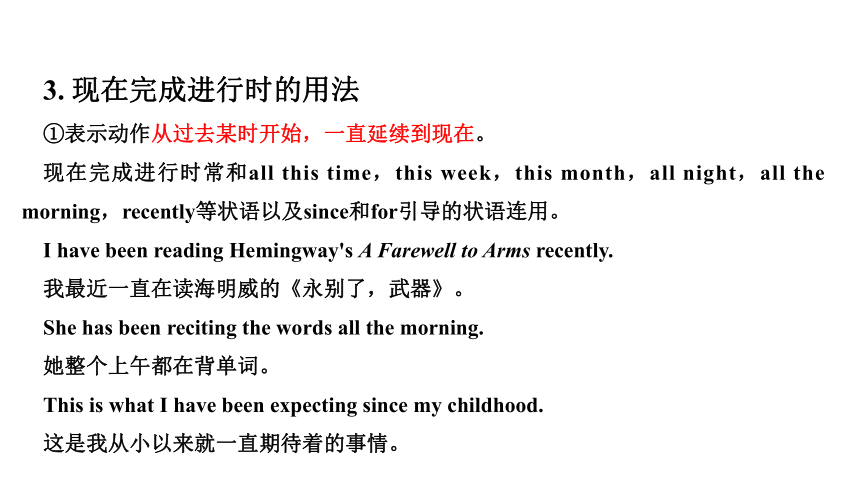
文档简介
(共19张PPT)
Period 2 Using language
Unit 6 Nurturing nature
1. To acquire the basic structure of present perfect continuous;
2. To learn the usage of present perfect continuous and practice.
Learning aims
Read and pay attention to the words in red.
What do they function
1. The researchers have been working hard to increase the population of the pandas.
Leading-in
Read and pay attention to the words in red.
What do they function
2. Shi Guangyin has been planting trees since 40 years ago.
现在完成进行时
Present perfect continuous
1.基本概念
现在完成进行时表示动作从过去某一时间开始一直持续到现在,这个动作可能刚终止,也可能还在进行。
2. 现在完成进行时的基本构成
现在完成进行时是由“have/has been+现在分词”构成的。
He is ill. He's been lying in bed for two months.
他病了。已经卧床两个月了。
Your eyes are red. Have you been crying
你眼睛红了。你刚刚一直哭吗?
What have you been doing all this morning
这一上午你干什么来着?
3. 现在完成进行时的用法
①表示动作从过去某时开始,一直延续到现在。
现在完成进行时常和all this time,this week,this month,all night,all the morning,recently等状语以及since和for引导的状语连用。
I have been reading Hemingway's A Farewell to Arms recently.
我最近一直在读海明威的《永别了,武器》。
She has been reciting the words all the morning.
她整个上午都在背单词。
This is what I have been expecting since my childhood.
这是我从小以来就一直期待着的事情。
②表示动作刚刚结束
My clothes are all wet. I've been working in the rain.
我的衣服全湿了。我刚才一直在雨中干活。
He is dead drunk. He's been drinking with his friends.
他烂醉如泥。他刚才一直在和朋友们喝酒。
③表示一个近期内时断时续、重复发生的动作。
You've been saying that for five years.
这话你已经说了五年了。
④表达较重的感彩。
What have you been doing to my dictionary
看你把我的字典弄成什么样子了?
Time has been flying so quickly!
时间过得可真快啊!
现在完成进行时常与表示一段时间的状语连用,例如:all the time, this week, all night, these few days, for..., since...等。
① A private detective has been tailing him for several weeks.
一位私人侦探几个星期以来一直在跟踪他。
② Craig loves outdoor activities- he skis in winter and has been fishing and hunting since he was a child.
Craig热爱户外活动-冬天他去滑雪,他从小就开始钓鱼和打猎。
4.常与现在完成进行时连用的时间状语
5. 现在完成进行时和现在完成时的比较
①现在完成进行时可以表示动作的重复,而现在完成时一般不表示重复性。
Have you been meeting him recently
你最近常和他见面吗?
Have you met him recently
你最近见到过他吗?
②现在完成进行时有时含有感彩,而现在完成时一般是平铺直叙。
I have been waiting for you for two hours.
我一直等了你两个小时。(可能表示不满)
I have waited for you for two hours.
我等了你两个小时。(说明一个事实)
③现在完成进行时强调动作,而现在完成时强调结果。
Who has been eating the oranges
谁一直在吃这些桔子呀?(还剩余一些)
Who has eaten the oranges
谁把桔子吃光了?(强调吃得一个不剩)
1. Tom ______ in the library every night over the last three months.
A. works B. worked
C. has been working D. had been working
2. Now that she is out of a job, Lucy ______ going back to school, but she hasn’t decided yet.
A. had considered
B. has been considering
C. considered
D. is going to consider
C
B
【即学即练】
3. I won’t tell the student the answer to the math problem until he ______ on it for more than an hour.
A. has been working B. will have worked
C. will have been working D. had worked
4. Cathy is taking notes of the grammatical rules in class at Sunshine School, where she ______ English for a year.
A. studies B. studied
C. is studying D. has been studying
A
D
5. —I have got a headache.
—No wonder. You ______ in front of that computer too long.
A. work B. are working
C. have been working D. worked
6. —I’m sure Andrew will win the first prize in the final.
—I think so. He ______ for it for months.
A. is preparing B. was preparing
C. had been preparing D. has been preparing
C
D
现在完成进行时态
基本构成
基本用法
与其连用的时间状语
与现在完成时态的区别
主要内容
基本概念
Summary
(1)The first use of atomic weapons was in 1945, and their power ___________________(increase) enormously ever since.
(2) Years ago we didn’t know this, but recent science ___________(show) that people who don’t sleep well get ill easily.
(3) —Look! Somebody _____________(clean) the sofa.
—Well, it wasn’t me. I didn’t do it.
(4) —How long ___________ you _____________(work) in the factory
—Since 1990.
(5) It is the most instructive lecture that I ______________(attend) since I came to this school.
1. Fill in the blanks with the correct tense.
has been increasing
has shown
has cleaned
have been working
have attended
Exercise
(6)—Do you regret not having gone abroad
—Not at all. I _____________ (not earn) as much, but I’m glad to contribute to our motherland.
(7)—Oh, no! We’re too late. The train ___________(leave).
—That’s OK. We’ll catch the next train to London.
(8)In order to find the missing child, villagers ______________(do) all they can over the past five hours.
(9)The manager ______________(tell) the workers how to improve the program since 9 am.
(10)The two friends _________________(chat) on the Internet for three hours, and they will go on till next morning.
have not earned
has left
have been doing
has been telling
have been chatting
Difficult circumstances serve as a textbook of life for people.
困难坎坷是人们的生活教科书。
Period 2 Using language
Unit 6 Nurturing nature
1. To acquire the basic structure of present perfect continuous;
2. To learn the usage of present perfect continuous and practice.
Learning aims
Read and pay attention to the words in red.
What do they function
1. The researchers have been working hard to increase the population of the pandas.
Leading-in
Read and pay attention to the words in red.
What do they function
2. Shi Guangyin has been planting trees since 40 years ago.
现在完成进行时
Present perfect continuous
1.基本概念
现在完成进行时表示动作从过去某一时间开始一直持续到现在,这个动作可能刚终止,也可能还在进行。
2. 现在完成进行时的基本构成
现在完成进行时是由“have/has been+现在分词”构成的。
He is ill. He's been lying in bed for two months.
他病了。已经卧床两个月了。
Your eyes are red. Have you been crying
你眼睛红了。你刚刚一直哭吗?
What have you been doing all this morning
这一上午你干什么来着?
3. 现在完成进行时的用法
①表示动作从过去某时开始,一直延续到现在。
现在完成进行时常和all this time,this week,this month,all night,all the morning,recently等状语以及since和for引导的状语连用。
I have been reading Hemingway's A Farewell to Arms recently.
我最近一直在读海明威的《永别了,武器》。
She has been reciting the words all the morning.
她整个上午都在背单词。
This is what I have been expecting since my childhood.
这是我从小以来就一直期待着的事情。
②表示动作刚刚结束
My clothes are all wet. I've been working in the rain.
我的衣服全湿了。我刚才一直在雨中干活。
He is dead drunk. He's been drinking with his friends.
他烂醉如泥。他刚才一直在和朋友们喝酒。
③表示一个近期内时断时续、重复发生的动作。
You've been saying that for five years.
这话你已经说了五年了。
④表达较重的感彩。
What have you been doing to my dictionary
看你把我的字典弄成什么样子了?
Time has been flying so quickly!
时间过得可真快啊!
现在完成进行时常与表示一段时间的状语连用,例如:all the time, this week, all night, these few days, for..., since...等。
① A private detective has been tailing him for several weeks.
一位私人侦探几个星期以来一直在跟踪他。
② Craig loves outdoor activities- he skis in winter and has been fishing and hunting since he was a child.
Craig热爱户外活动-冬天他去滑雪,他从小就开始钓鱼和打猎。
4.常与现在完成进行时连用的时间状语
5. 现在完成进行时和现在完成时的比较
①现在完成进行时可以表示动作的重复,而现在完成时一般不表示重复性。
Have you been meeting him recently
你最近常和他见面吗?
Have you met him recently
你最近见到过他吗?
②现在完成进行时有时含有感彩,而现在完成时一般是平铺直叙。
I have been waiting for you for two hours.
我一直等了你两个小时。(可能表示不满)
I have waited for you for two hours.
我等了你两个小时。(说明一个事实)
③现在完成进行时强调动作,而现在完成时强调结果。
Who has been eating the oranges
谁一直在吃这些桔子呀?(还剩余一些)
Who has eaten the oranges
谁把桔子吃光了?(强调吃得一个不剩)
1. Tom ______ in the library every night over the last three months.
A. works B. worked
C. has been working D. had been working
2. Now that she is out of a job, Lucy ______ going back to school, but she hasn’t decided yet.
A. had considered
B. has been considering
C. considered
D. is going to consider
C
B
【即学即练】
3. I won’t tell the student the answer to the math problem until he ______ on it for more than an hour.
A. has been working B. will have worked
C. will have been working D. had worked
4. Cathy is taking notes of the grammatical rules in class at Sunshine School, where she ______ English for a year.
A. studies B. studied
C. is studying D. has been studying
A
D
5. —I have got a headache.
—No wonder. You ______ in front of that computer too long.
A. work B. are working
C. have been working D. worked
6. —I’m sure Andrew will win the first prize in the final.
—I think so. He ______ for it for months.
A. is preparing B. was preparing
C. had been preparing D. has been preparing
C
D
现在完成进行时态
基本构成
基本用法
与其连用的时间状语
与现在完成时态的区别
主要内容
基本概念
Summary
(1)The first use of atomic weapons was in 1945, and their power ___________________(increase) enormously ever since.
(2) Years ago we didn’t know this, but recent science ___________(show) that people who don’t sleep well get ill easily.
(3) —Look! Somebody _____________(clean) the sofa.
—Well, it wasn’t me. I didn’t do it.
(4) —How long ___________ you _____________(work) in the factory
—Since 1990.
(5) It is the most instructive lecture that I ______________(attend) since I came to this school.
1. Fill in the blanks with the correct tense.
has been increasing
has shown
has cleaned
have been working
have attended
Exercise
(6)—Do you regret not having gone abroad
—Not at all. I _____________ (not earn) as much, but I’m glad to contribute to our motherland.
(7)—Oh, no! We’re too late. The train ___________(leave).
—That’s OK. We’ll catch the next train to London.
(8)In order to find the missing child, villagers ______________(do) all they can over the past five hours.
(9)The manager ______________(tell) the workers how to improve the program since 9 am.
(10)The two friends _________________(chat) on the Internet for three hours, and they will go on till next morning.
have not earned
has left
have been doing
has been telling
have been chatting
Difficult circumstances serve as a textbook of life for people.
困难坎坷是人们的生活教科书。
